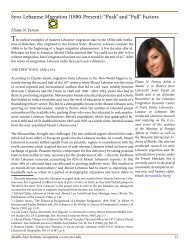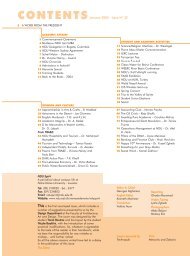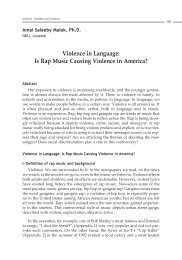OUTLINE - Notre Dame University
OUTLINE - Notre Dame University
OUTLINE - Notre Dame University
Create successful ePaper yourself
Turn your PDF publications into a flip-book with our unique Google optimized e-Paper software.
CULTURE<br />
- gone down<br />
the drain!<br />
K.J. Mortimer<br />
In Britain one hears about the “yob”<br />
culture, decried by Prime Minister<br />
Tony Blair. What does it mean? It<br />
means drunken hooliganism, football<br />
riots and a hatred of education<br />
and of everything that improves<br />
mankind. In the nineteen-eighties<br />
they spoke about the “yuppy” culture,<br />
the culture of Young<br />
Upwardly-mobile People, social<br />
climbers in business and the professions,<br />
thinking only of smart dress,<br />
flashy cars, cocktail parties and<br />
noisy, drunken all-night raves. Can<br />
these be called cultures?<br />
Once upon a time the word culture<br />
was used in the meaning of refinement,<br />
good taste in music and art<br />
and literature, a code of politeness<br />
and good manners, a certain intellectual<br />
life. A cultured person was one<br />
with a certain elevation of mind, one<br />
formed by the classics in his own<br />
language and also in Latin and<br />
Greek and therefore formed to<br />
habits of clear, logical thinking,<br />
speech and writing. Students at<br />
Harvard <strong>University</strong> used to debate<br />
in Latin. When Queen Elizabeth the<br />
First visited Oxford <strong>University</strong>, after<br />
listening to the pompous speeches of<br />
welcome in Latin and Greek, she<br />
answered them fluently and without<br />
preparation in the same languages.<br />
In Victorian times one could rightly<br />
speak of culture, because despite certain<br />
absurdities, there was a general<br />
upward movement among all classes<br />
of the population. There was a<br />
strong sense of individual duty in<br />
the public and national interest.<br />
Education was steadily extended to<br />
the poor so that they could improve<br />
themselves and they did improve<br />
themselves. There can be no comparison<br />
between the material and<br />
moral condition of the working class<br />
in Britain in the mid-twentieth century<br />
and its condition in the early<br />
nineteenth century. People appreciated<br />
and wanted education.<br />
At the same time it was being<br />
realised that tribal peoples were not<br />
“savages”, as they had previously<br />
been called. Therefore one could<br />
legitimately talk about a Mousterian<br />
culture, a Neolithic culture, a Bantu<br />
culture, an Inuit (Eskimo) culture, an<br />
Australian Aboriginal culture or<br />
American Indian cultures. All these<br />
peoples who had survived over<br />
many thousands of years had techniques,<br />
highly complex and logical<br />
languages (see Levi-Strauss La Pensée<br />
primitive), amazingly sophisticated<br />
art and song and oral literature, a<br />
common background of religion,<br />
philosophy and good manners, and<br />
a certain social cohesion.<br />
Now, to be frank, it is hard to talk<br />
about Anglo-Saxon culture in the<br />
same way as one can talk about la<br />
culture française (but has that started<br />
to go down the drain as well?) The<br />
French have long cultivated what<br />
they call l’esprit. The English word<br />
spirit hardly translates it, but one<br />
may say that it refers to the disciplines<br />
of the mind and of intellectual<br />
life. In French, as in Latin and<br />
Greek, the word philosophy implies a<br />
discipline of exact thinking, whereas<br />
in English-speaking countries, outside<br />
certain university circles, it is<br />
generally taken to mean woolly<br />
speculation. In passing, we may add<br />
that the Scottish mentality in these<br />
matters is closer to the French than<br />
to the English. In France to say of<br />
somebody C’est un intellectuel is a<br />
high compliment, whereas to call<br />
somebody an intellectual in Englishspeaking<br />
society is almost an insult,<br />
like using the word egg-head, which<br />
has no common equivalent in<br />
French.<br />
Now a fundamental element of any<br />
culture is a common language, a<br />
common means of communication.<br />
Therefore it is most remarkable that<br />
in the English-speaking world the<br />
English language is not studied in<br />
schools. I met a graduate in English<br />
Literature from the élitist Cambridge<br />
<strong>University</strong> who told me that until he<br />
took courses in teaching English as a<br />
foreign language to be a British<br />
Council instructor, he had never<br />
learned either the names or the use<br />
of the English tenses of verbs. This<br />
did not matter so much when people<br />
used to spend much of their time<br />
reading good books and informative,<br />
well-written newspapers and<br />
magazines, and when the middle<br />
and upper classes had done at least<br />
some basic Latin, when a radio presenter<br />
of popular music would speak<br />
good English. I still possess a couple<br />
of letters written to me by workingclass<br />
women who spent perhaps<br />
four or five years in a poor village<br />
school towards the end of the nineteenth<br />
century, just over one hundred<br />
years ago. The grammar, syntax,<br />
punctuation and capitalisation<br />
are impeccable and the interesting<br />
content is really a pleasure to read.<br />
But now the results of failing to<br />
teach grammatical, lucid, logical,<br />
economical, reasonably elegant and<br />
internationally acceptable English<br />
are disastrous.<br />
Disastrous? This is no exaggeration.<br />
There was a disastrous fire in a<br />
London railway station which<br />
spread simply because the instructions<br />
for the railway staff in the even<br />
of a fire were so badly written and<br />
confused that they could not understand<br />
what they were supposed to do.<br />
Regional dialects are delightful;<br />
dialect, what the French call patois, is<br />
a traditional variant, often centuries<br />
old, of the generally received national<br />
language. Slang however is an<br />
adaptation, often in constant flux, of<br />
the “official” language. It too can be<br />
delightful. I still enjoy memories of<br />
58 NNU SPIRIT
















